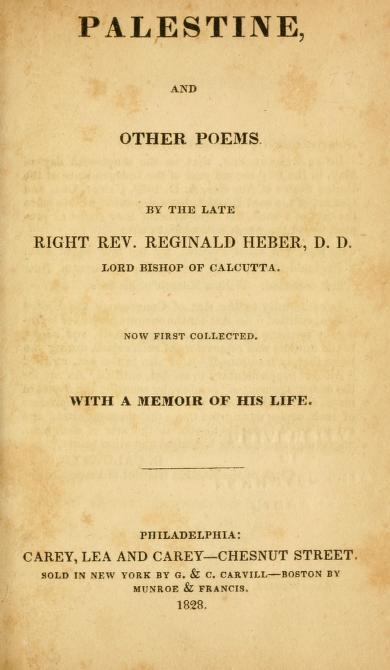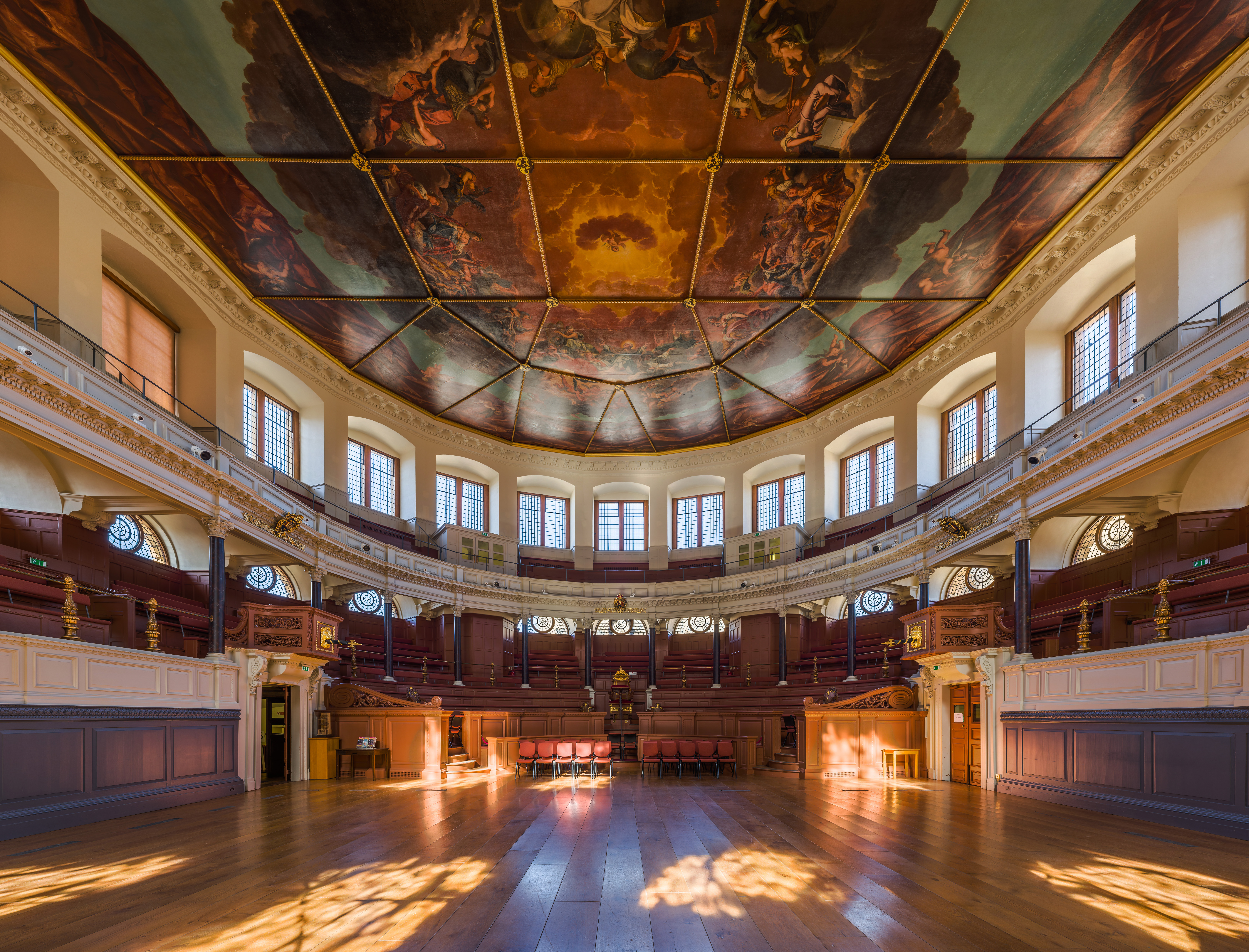|
Palestine (poem)
''Palestine'' is an 1803 romantic long poem by noted clergyman Reginald Heber, successfully entered for the Newdigate Prize. Background Heber had been helped in this composition by Sir Walter Scott, a family friend, before the future novelist's years of fame. They'd had a discussion over breakfast about Palestine (region), Palestine, and he began writing it before he left the table. When Heber declaimed the poem at that year's Encaenia ceremony at the Sheldonian Theatre, it was given an enthusiastic reception. The poem was later published, and in 1812 was set to music by the composer William Crotch as an oratorio. Crotch had been professor of music at Oxford since 1797. Reception Montefiore, writing in 1902, described the poem as "the most successful and popular piece of religious verse of the first half of the [19th] century". A later biographer, Derrick Hughes, finds its contemporary acclaim puzzling: "It is not a good, not even a mediocre poem; it is leaden". In the United ... [...More Info...] [...Related Items...] OR: [Wikipedia] [Google] [Baidu] |
Palestine Poems
__NOTOC__ Palestine may refer to: * State of Palestine, a state in Western Asia * Palestine (region), a geographic region in Western Asia * Palestinian territories, territories occupied by Israel since 1967, namely the West Bank (including East Jerusalem) and the Gaza Strip * Palestinian enclaves, the areas designated for Palestinians under a variety of US and Israeli-led proposals * Mandatory Palestine (1920–1948), a geopolitical entity under British administration * Timeline of the name Palestine, Timeline of the name ''Palestine'' lists other historic uses Other places Canada * Palestine, Ontario Iraq * Palestine Hotel, in Baghdad * Palestine Street, in Baghdad Saudi Arabia * Palestine Street, Jeddah United Kingdom * Palestine, Hampshire, England * Palestine Place, headquarters in London of the Church of England's organization Church's Ministry Among Jewish People United States * Palestine, Arkansas * Palestine, a community of Newtown, Connecticut * Palestine, ... [...More Info...] [...Related Items...] OR: [Wikipedia] [Google] [Baidu] |
Reginald Heber
Reginald Heber (21 April 1783 – 3 April 1826) was an English Anglican bishop, man of letters and hymn-writer. After 16 years as a country parson, he served as Bishop of Calcutta until his death at the age of 42. The son of a rich landowner and cleric, Heber gained fame at the University of Oxford as a poet. After graduation he made an extended tour of Scandinavia, Russia and Central Europe. Ordained in 1807, he took over his father's old parish, Hodnet, Shropshire. He also wrote hymns and general literature, including a study of the works of the 17th-century cleric Jeremy Taylor. He was consecrated Bishop of Calcutta in October 1823. He travelled widely and worked to improve the spiritual and general living conditions of his flock. Arduous duties, a hostile climate and poor health led to his collapse and death after less than three years in India. Memorials were erected there and in St Paul's Cathedral, London. A collection of his hymns appeared soon after his death. "H ... [...More Info...] [...Related Items...] OR: [Wikipedia] [Google] [Baidu] |
Walter Scott
Sir Walter Scott, 1st Baronet (15 August 1771 – 21 September 1832), was a Scottish novelist, poet, playwright and historian. Many of his works remain classics of European and Scottish literature, notably the novels ''Ivanhoe'', ''Rob Roy (novel), Rob Roy'', ''Waverley (novel), Waverley'', ''Old Mortality'', ''The Heart of Mid-Lothian'' and ''The Bride of Lammermoor'', and the narrative poems ''The Lady of the Lake (poem), The Lady of the Lake'' and ''Marmion (poem), Marmion''. He had a major impact on European and American literature. As an advocate, judge and legal administrator by profession, he combined writing and editing with daily work as Clerk of Session and Sheriff court, Sheriff-Depute of Selkirkshire. He was prominent in Edinburgh's Tory (political faction), Tory establishment, active in the Royal Highland and Agricultural Society of Scotland, Highland Society, long a president of the Royal Society of Edinburgh (1820–1832), and a vice president of the Society o ... [...More Info...] [...Related Items...] OR: [Wikipedia] [Google] [Baidu] |
Palestine (region)
Palestine ( el, Παλαιστίνη, ; la, Palaestina; ar, فلسطين, , , ; he, פלשתינה, ) is a geographic region in Western Asia. It is usually considered to include Israel and the State of Palestine (i.e. West Bank and Gaza Strip), though some definitions also include part of northwestern Jordan. The first written records to attest the name of the region were those of the Twentieth dynasty of Egypt, which used the term "Peleset" in reference to the neighboring people or land. In the 8th century, Assyrian inscriptions refer to the region of "Palashtu" or "Pilistu". In the Hellenistic period, these names were carried over into Greek, appearing in the Histories of Herodotus in the more recognizable form of "Palaistine". The Roman Empire initially used other terms for the region, such as Judaea, but renamed the region Syria Palaestina after the Bar Kokhba revolt. During the Byzantine period, the region was split into the provinces of Palaestina Prima, Palaestin ... [...More Info...] [...Related Items...] OR: [Wikipedia] [Google] [Baidu] |
Encaenia
Encaenia (; ) is an academic or sometimes ecclesiastical ceremony, usually performed at colleges or universities. It generally occurs some time near the annual ceremony for the general conferral of degrees to students. The word is from Latin, meaning dedication or consecration, and is ultimately derived from the Greek εγκαίνια (''enkainia''), meaning a festival of renewal or dedication, and corresponds to the English term ''commencement''. The term was originally used to indicate the eight days of celebration for the dedication of the Church of the Holy Sepulchre in Jerusalem, which celebration covered also to the discovering of the True Cross by Empress Helena in 326. Because the Church of the Holy Sepulchre was consecrated on September 13, 335, the Encaenia started on September 13, while the cross itself was brought outside the church on September 14 so that the clergy and faithful could pray before the True Cross (Feast of the Cross). United Kingdom At certain univer ... [...More Info...] [...Related Items...] OR: [Wikipedia] [Google] [Baidu] |
Sheldonian Theatre
Sheldonian Theatre, located in Oxford, England, was built from 1664 to 1669 after a design by Christopher Wren for the University of Oxford. The building is named after Gilbert Sheldon, chancellor of the University at the time and the project's main financial backer. It is used for music concerts, lectures and University ceremonies, but not for drama until 2015 when the Christ Church Dramatic Society staged a production of ''The Crucible'' by Arthur Miller. History What came to be known as the Sheldonian Theatre was Wren's second work and was commissioned by Gilbert Sheldon, Archbishop of Canterbury. With the triumph of the Restoration and with it the Church of England, Dean Fell, Vice-Chancellor of the University, sought to revive a project proposed in the 1630s by the late William Laud, Archbishop of Canterbury: a separate building whose sole use would be graduation and degree ceremonies. In the past these increasingly rowdy occasions had taken place in the University Chur ... [...More Info...] [...Related Items...] OR: [Wikipedia] [Google] [Baidu] |
William Crotch
William Crotch (5 July 177529 December 1847) was an English composer and organist. According to the American musicologist Nicholas Temperley, Crotchwas "a child prodigy without parallel in the history of music", and was certainly the most distinguished English musician in his day. Life Childhood William Crotch was born in Norwich, Norfolk, to a master carpenter. Like Mozart, he was a child prodigy, playing the organ his father had built. At the age of two he became a local celebrity by performing for visitors, among them the musician Charles Burney, who wrote an account of his visits for the Royal Society. The three--year-old Crotch was taken to London by his ambitious mother, where he not only played on the organ of the Chapel Royal in St James's Palace, but performed for King George III. ''The London Magazine'' of April 1779 recorded: He appears to be fondest of solemn tunes and church musick, particularly the 104th Psalm. As soon as he has finished a regular tune, or part o ... [...More Info...] [...Related Items...] OR: [Wikipedia] [Google] [Baidu] |
Charles E
Charles is a masculine given name predominantly found in English and French speaking countries. It is from the French form ''Charles'' of the Proto-Germanic name (in runic alphabet) or ''*karilaz'' (in Latin alphabet), whose meaning was "free man". The Old English descendant of this word was '' Ċearl'' or ''Ċeorl'', as the name of King Cearl of Mercia, that disappeared after the Norman conquest of England. The name was notably borne by Charlemagne (Charles the Great), and was at the time Latinized as ''Karolus'' (as in ''Vita Karoli Magni''), later also as '' Carolus''. Some Germanic languages, for example Dutch and German, have retained the word in two separate senses. In the particular case of Dutch, ''Karel'' refers to the given name, whereas the noun ''kerel'' means "a bloke, fellow, man". Etymology The name's etymology is a Common Germanic noun ''*karilaz'' meaning "free man", which survives in English as churl (< Old English ''ċeorl''), which developed its depr ... [...More Info...] [...Related Items...] OR: [Wikipedia] [Google] [Baidu] |





